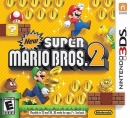| Asriel said: There are a few factors: 1) Most major European economies are either in recession, or at risk of recession. Living costs have escalated wildly in Europe, and most peoples wages haven't accelerated anywhere near in line with this. Basically, disposable income across Europe is very low, so there's less to spend on non-essential goods. 2) Nintendo don't have the kind of historical strength they have in the US and Japan, where Nintendo established themselves as THE gaming company in the 1980's. The first majorly successful home console in Europe was the PS1. This accounts for some of the apathy towards Wii U, as Wii, largely through the 'expanded audience', was Nintendo's first home console success story in Europe. There's less of an entrenched fanbase for Nintendo's products, particularly their home consoles. Nintendo have historically treated Europe as a second class market, and although this has changed in recent years, it's an impression that is still rooted in hobbyist gamers minds: the consumers Nintendo need to drive Wii U's install base, are less likely to buy Nintendo hardware in Europe than they are in Japan or America. 3) Pricing. Software and hardware prices are comparatively higher than their US counterparts, particularly when it comes to Wii U. Nintendo's levels of success with digital sales are dragged down by Europe, because digital European prices are almost always higher than the retail equivalent: a recipe for disaster when it comes to boosting your digital sales. Prices need to be equivalent, or lower, than retail, as is the case in the US and Japan. There are further problems with pricing, but I'll address this in the next point. The price of Wii U hardware needs to come down. Basic Wii U hardware bundles are reportedly selling very poorly in Europe. Nintendo, ideally, should drop the basic and lower the price of the premium to the current basic price as soon as it is financially viable. 4) Tablets and smartphones: Like it or not, these devices and the business models and app stores that come with them, have radically altered the videogame market. There is still room for dedicated games devices, but consoles will have to change at a faster pace if they hope to avoid becoming a very niche sector of the industry. More flexible software pricing is needed. In an age where people can subscribe, go free to play, and download thousands of titles for pennies or nothing at all, expectations of what to pay for videogames will naturally alter. Thus far, Nintendo have done too little to recognise this. Having every new 3DS release in the £30 to £40 range does not acknowledge the changing market. Nintendo need to have tiered pricing in order to boost software sales and make 3DS a more attractive proposition. There is still a market that will pay £30 to £40 for games, but that market will not grow without a more flexible approach to pricing. Furthermore, Europe is a less developed home and portable console market than either the US or Japan, which, as I have said, experienced the boom in consoles from the 1980's onwards. Europe was essentially a decade late in this trend. And although Nintendo's portables have historically done well in Europe, they are less entrenched than they are in portable mad Japan, or the US, with its historical association with Nintendo and Nintendo's brands going back nearly 30 years. In this less developed market, a market less entrenched into buying certain devices and brands, particularly Nintendo devices and brands, the rise in tablet and smartphone gaming has been more disruptive to Nintendo's business than it has been in other markets. Nintendo need to address their European problem as quickly as possible. Prices need to come down digitally and at retail, and need to be more flexible. Start at £15, go up by intervals of £5, and reserve the £30 to £35 for the best games. Embrace digital, free-to-play, subscriptions and episodic gaming in the coming years. Lower the price of Wii U hardware and make sure the advertising campaign is crystal clear. Lower the price of Wii U games: £45 or more is not a good strategy when hobbyist gamers are used to paying £35, £40 tops for the latest big releases. A lot of factors mean Nintendo is out of step with what European gamers want, but it can be remedied, and it should be remedied. Europe as a gaming market has plenty of room for expansion, but without Nintendo adjusting their pricing, marketing, and their approach to Europe, the gaming population will only expand onto smart devices and not onto Nintendo branded devices. They need to change course in Europe before it's too late. |
Great post. Agree 100%. And imho a lot of this also applies to America. The prices are just too high in today's changing landscape. And the marketing for the U is just missing the mark.











































































